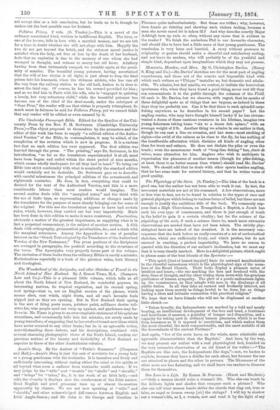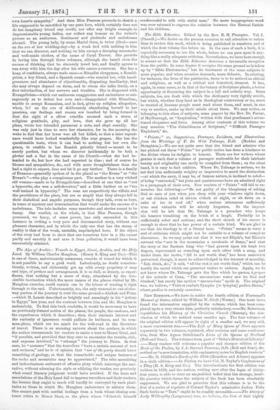One Love in a Life. By Emma M. Pearson. (Herat
and Blackett.) —" Only a woman should write a woman's life. Who else can touch in the delicate lights and shades that compose such a picture ? Who else can tell what unseen hands strike the chords that ring out, true or false, as angel or demon sweep [sic] the strings? I will try to shadow out a woman's life, as I, a woman, saw and read it by the light of my own heart's sympathy." And then Miss Pearson proceeds to sketch a life supposed to be sanctified by one pure love, which certainly does not do her imaginary friend any credit, nor offer any bright example to impressionable young ladies, nor reflect any honour on the writer's powers as an authoress. Sentiment and platitude and melodrama abound. The young lady, by name Muriel Gore, is twice jilted—once on the eve of her wedding-day—by a weak fool with nothing in him that we can discover, and nothing on him except a drooping moustache and well-made clothes, of the name of Caryl Trevor. She persists in loving him through three volumes, although she hasn't oven the excuse of thinking that he sincerely loved her, and finally agrees to ran away with him the day after his wife enters a convent. She has a heap of confidants, always male ones—a Ritualist clergyman, a Romish priest, a boy friend, and a Spanish count—who remind her, with hand- pressures and abundance of objectionable, disgusting familiarity, that she may always depend on them, and to whom she talks freely, on a first introduction, of her sorrows and troubles. She is disgusted with Evangelicism—which our authoress exaggerates and caricatures so out- rageously as to defeat her own end—disappointed with Ritualism, unable to accept Romanism, and in fact, gives up religion altogether, when, lo ! on the eve of deliberately abandoning herself to her passions, our feelings and reason are insulted by being formed in that the sight of a silver crucifix aroused such a storm of religions gratitude, pity, and love, that she gave up all her plans, wrote her intended paramour a note, and slept soundly. She was only just in time to save her character, for in the morning she woke to find that her lover was all but killed, so that a later repent- ance would have looked wonderfully like sour grapes.. She has the questionable taste, when it can lead to nothing but her own dis- grace, to confide to her Romish priestly friend — meant to be nearly perfect, but whom we discover incidentally to be both a plotter and a liar in the cause of his Church—what she had in- tended to do, but how she had repented in time ; and of course he blesses and sympathises, &c., and with more thoughtfulness than she had a right to expect, does not let it go any further. There is a family of Evanses—generally spoken of in the plural as "the Evans" or "the Evans's "—who play a conspicuous part. The mother is a very wicked old woman—made so by Evangelicism—described at one time as "not a hypocrite, she was a self-deceiver," and a little further on as "too well trained in hypocrisy." The sons are respectively the villain and the providence of the piece, but are so stupid that they always fail in their diabolical and angelic purposes, though they talk, even as boys, in tones of mystery and determination that would make the success of a melodrama. The tale includes some anecdotes and stories meant to be funny. Our verdict, on the whole, is that Miss Pearson, though possessed, we fancy, of some power, has only succeeded in this instance in writing a very poor and disconnected story, without one pleasant character, and in which the only one that has the stamp of reality is that of the weak, unstable, unprincipled hero. If the object of the story had been to show that one tenacious love in a life cannot purify and sanctify it and save it from pollution, it would have been successfully attained.



































 Previous page
Previous page